Abstract
The effect of H2-receptor blockade on intragastric acidity was studied in nine normal males. The pH of their gastric contents was measured at hourly daytime and two hourly nighttime intervals for 48 hours. The subjects ate identical meals, drank identical volumes of fluid, and smoked the same number of cigarettes during the two study days. Their physical activity was unrestricted in a ward environment. Blood cimetidine and plasma gastrin were measured in serial blood samples. The nine subjects were treated in random sequence with cimetidine 0-8-1-0 g on one day and placebo capsules on the other. The drug was given in four divided doses: four subjects received it before, and five after, the three main meals. All took the fourth dose at bedtime. Replicate studies in an additional subject given placebo on both study days showed good reproducibility (r=0-80, P less than 0-01). Cimetidine therapy decreased intragastric acidity in all nine subjects. The decrease was similar in the two groups taking the drug before or after meals, mean 24 h intragastric hydrogen ion activity being lowered by 70 and 72% respectively. Nocturnal anacidity was recorded in only two of 45 samples. Administration of cimetidine before meals produced earlier and higher drug blood levels than post-prandial medication, but when it was taken after food the blood levels were highest at the time when the buffer capacity of the food was waning. Blood concentrations of cimetidine exceeded the secretory IC50 level for most of the time between doses. The results show that cimetidine 0-8-1-0 g/day in four divided doses produces a striking and consistent decrease of intragastric acidity. Although variation in the timing of the dose in relation to meals did not affect the decrease of acidity, the absorption data suggest that patients should take the drug after meals.
Full text
PDF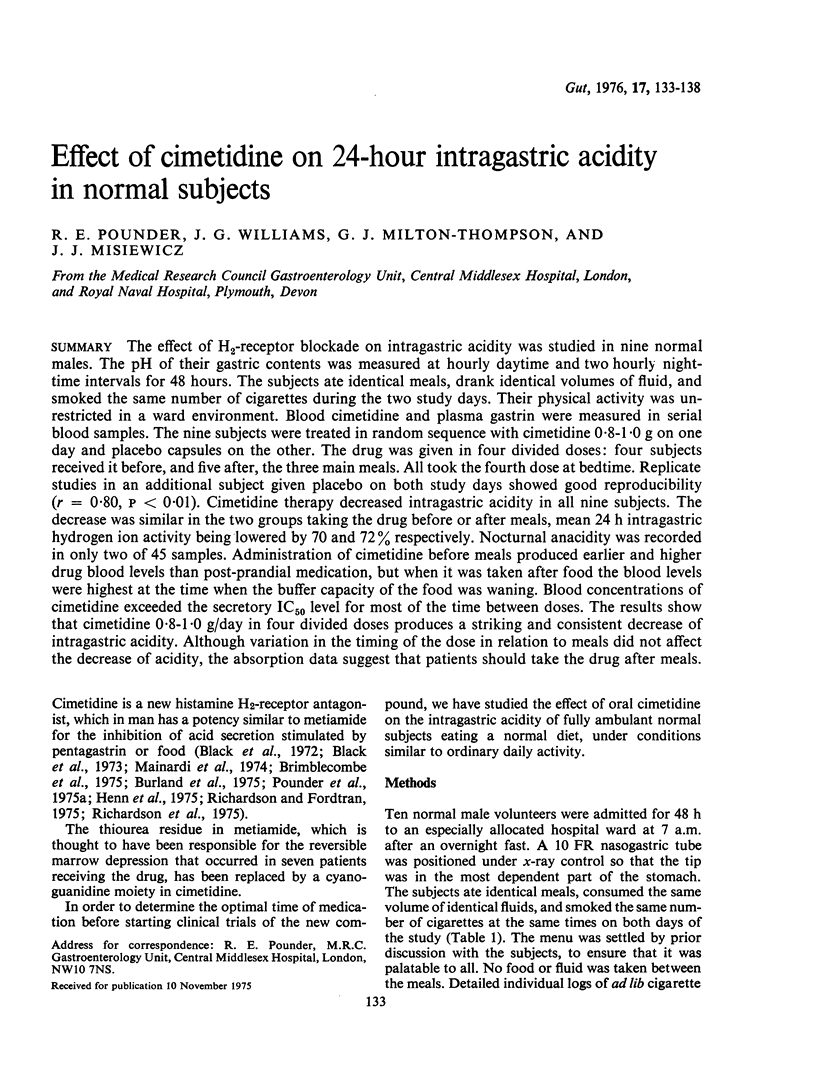
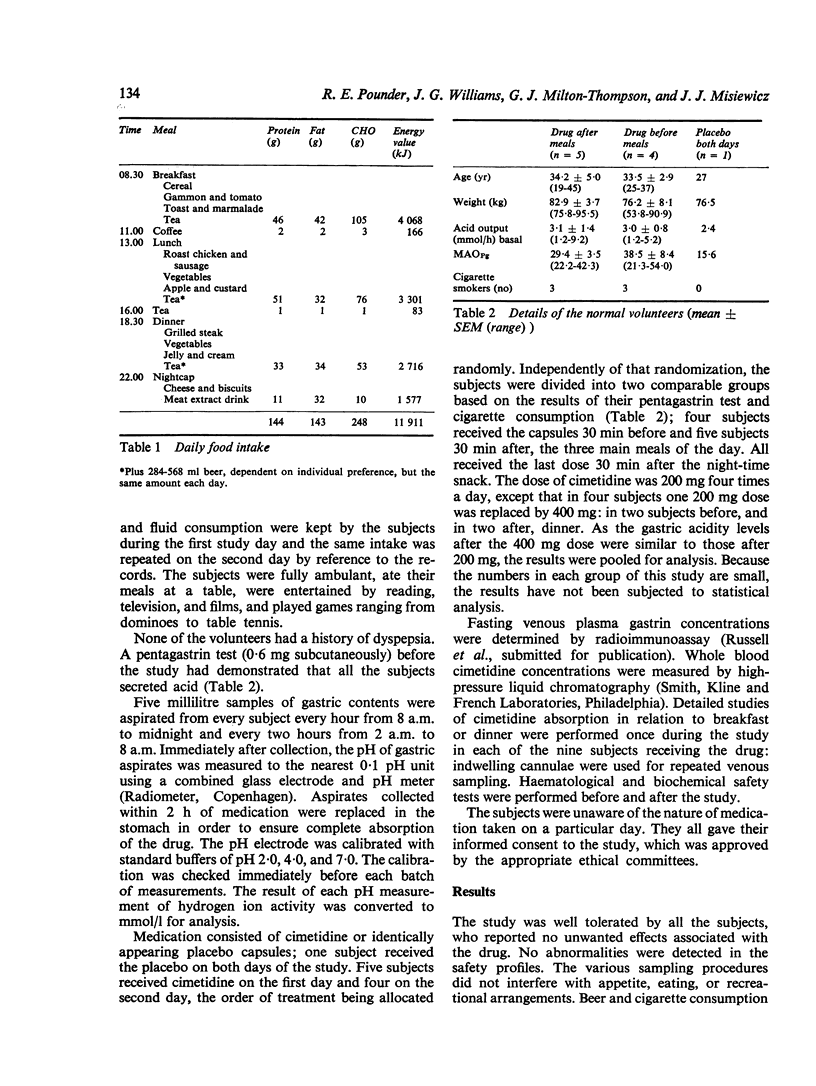
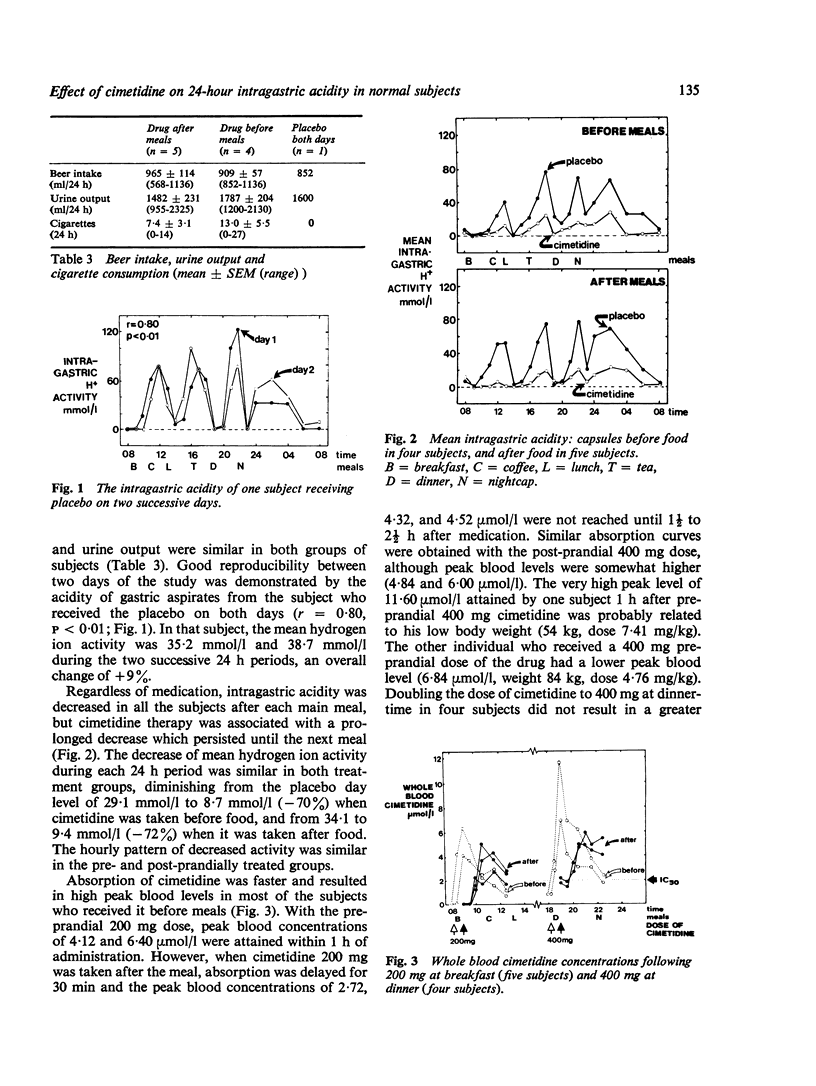
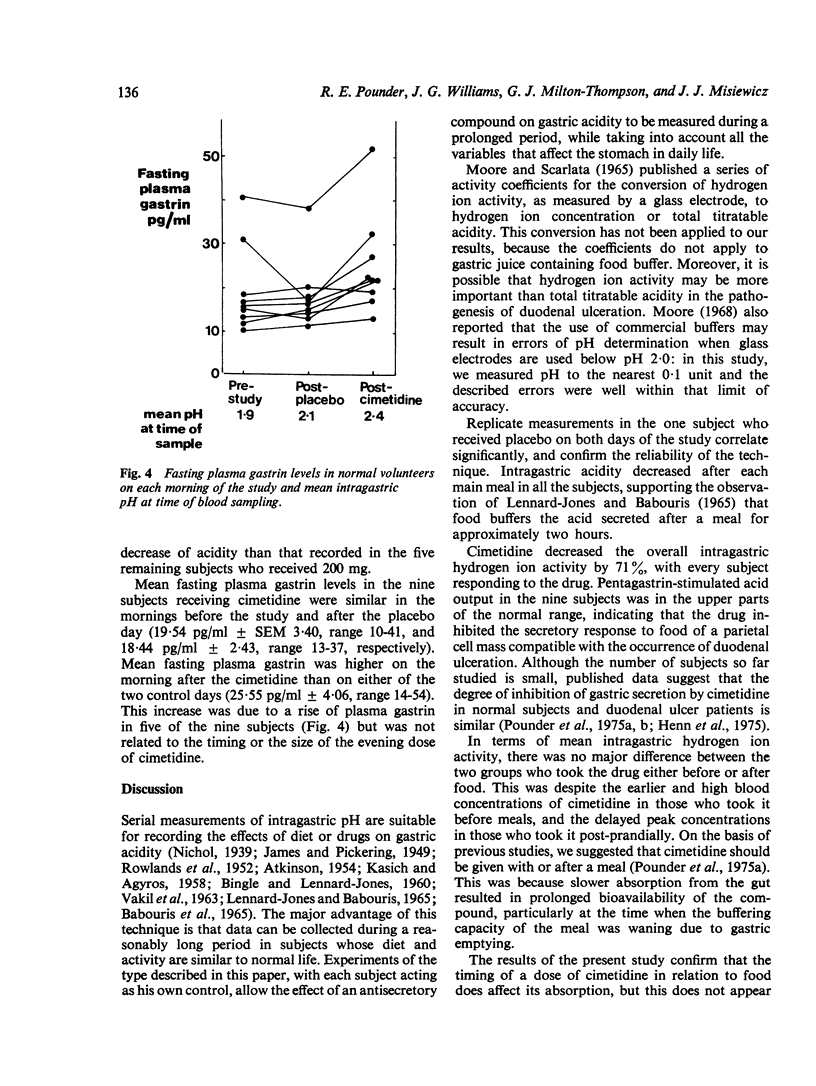
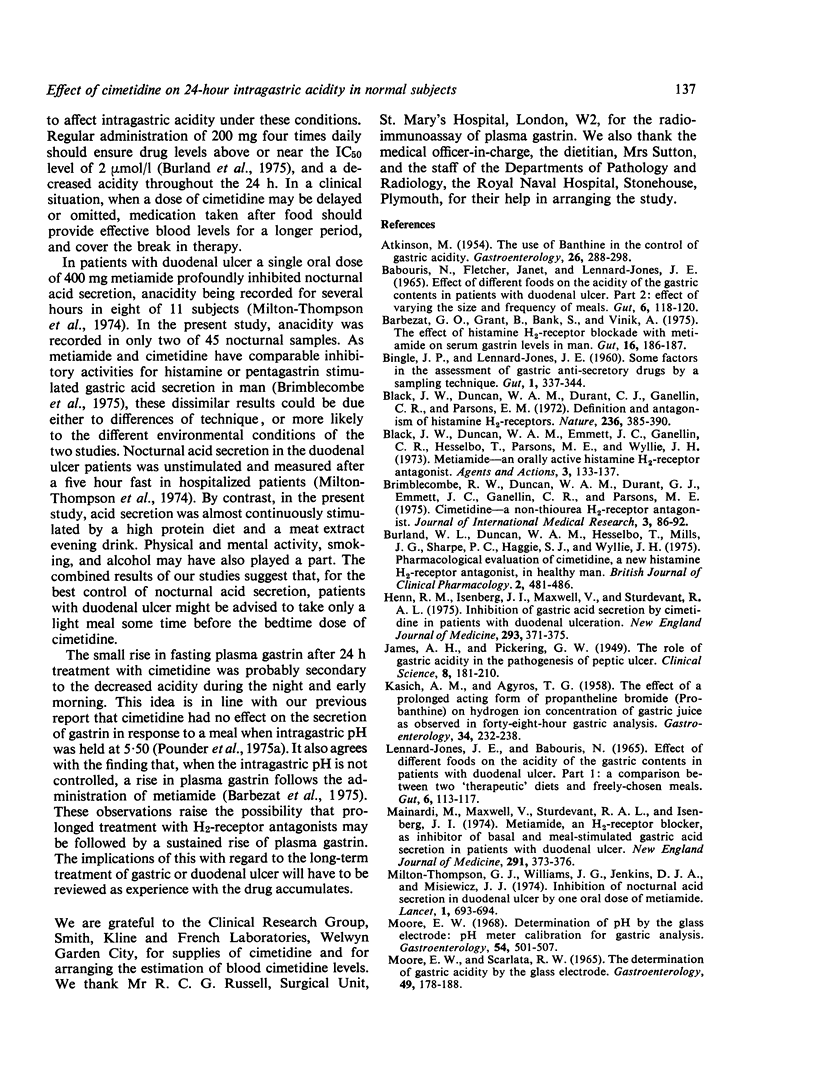
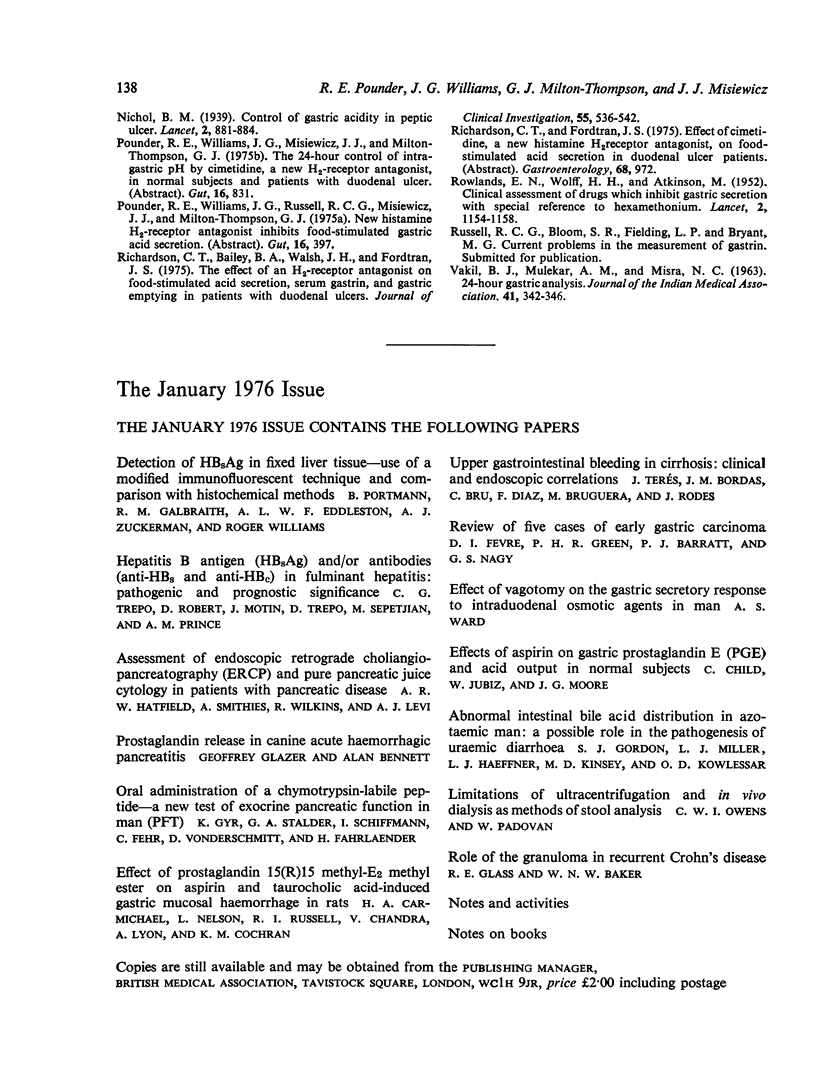
Selected References
These references are in PubMed. This may not be the complete list of references from this article.
- ATKINSON M. The use of banthine in the control of gastric acidity. Gastroenterology. 1954 Feb;26(2):288–298. [PubMed] [Google Scholar]
- BABOURIS N., FLETCHER J., LENNARD-JONES J. E. EFFECT OF DIFFERENT FOODS ON THE ACIDITY OF THE GASTRIC CONTENTS IN PATIENTS WITH DUODENAL ULCER. II. EFFECT OF VARYING THE SIZE AND FREQUENCY OF MEALS. Gut. 1965 Apr;6:118–120. doi: 10.1136/gut.6.2.118. [DOI] [PMC free article] [PubMed] [Google Scholar]
- Barbezat G. O., Grant B., Bank S., Vinik A. The effect of histamine H2-receptor blockade with metiamide on serum gastrin levels in man. Gut. 1975 Mar;16(3):186–187. doi: 10.1136/gut.16.3.186. [DOI] [PMC free article] [PubMed] [Google Scholar]
- Bingle J. P., Lennard-Jones J. E. Some Factors in the Assessment of Gastric Antisecretory Drugs by a Sampling Technique. Gut. 1960 Dec;1(4):337–344. doi: 10.1136/gut.1.4.337. [DOI] [PMC free article] [PubMed] [Google Scholar]
- Black J. W., Duncan W. A., Durant C. J., Ganellin C. R., Parsons E. M. Definition and antagonism of histamine H 2 -receptors. Nature. 1972 Apr 21;236(5347):385–390. doi: 10.1038/236385a0. [DOI] [PubMed] [Google Scholar]
- Black J. W., Duncan W. A., Emmett J. C., Ganellin C. R., Hesselbo T., Parsons M. E., Wyllie J. H. Metiamide--an orally active histamine H2-receptor antagonist. Agents Actions. 1973 Oct;3(3):133–137. doi: 10.1007/BF01965723. [DOI] [PubMed] [Google Scholar]
- Burland W. L., Duncan W. A., Hesselbo T., Mills J. G., Sharpe P. C., Haggie S. J., Wyllie J. H. Pharmacological evaluation of cimetidine, a new histamine H2-receptor antagonist, in healthy man. Br J Clin Pharmacol. 1975 Dec;2(6):481–486. doi: 10.1111/j.1365-2125.1975.tb00564.x. [DOI] [PMC free article] [PubMed] [Google Scholar]
- Henn R. M., Isenberg J. I., Maxwell V., Sturdevant R. A. Inhibition of gastric acid secretion by cimetidine in patients with duodenal ulcer. N Engl J Med. 1975 Aug 21;293(8):371–375. doi: 10.1056/NEJM197508212930802. [DOI] [PubMed] [Google Scholar]
- KASICH A. M., ARGYROS T. G. The effect of a prolonged acting form of propantheline bromide (pro-banthine) on hydrogen ion concentration of gastric juice as observed in forty-eight-hour gastric analysis. Gastroenterology. 1958 Feb;34(2):232–238. [PubMed] [Google Scholar]
- LENNARD-JONES J. E., BABOURIS N. EFFECT OF DIFFERENT FOODS ON THE ACIDITY OF THE GASTRIC CONTENTS IN PATIENTS WITH DUODENAL ULCER. I. A COMPARISON BETWEEN TWO 'THERAPEUTIC' DIETS AND FREELY-CHOSEN MEALS. Gut. 1965 Apr;6:113–117. doi: 10.1136/gut.6.2.113. [DOI] [PMC free article] [PubMed] [Google Scholar]
- MOORE E. W., SCARLATA R. W. THE DETERMINATION OF GASTRIC ACIDITY BY THE GLASS ELECTRODE. Gastroenterology. 1965 Aug;49:178–188. [PubMed] [Google Scholar]
- Mainardi M., Maxwell V., Sturdevant R. A., Isenberg J. I. Metiamide, an H2-receptor blocker, as inhibitor of basal and meal-stimulated gastric acid secretion in patients with duodenal ulcer. N Engl J Med. 1974 Aug 22;291(8):373–376. doi: 10.1056/NEJM197408222910801. [DOI] [PubMed] [Google Scholar]
- Milton-Thompson G. J., Williams J. G., Jenkins D. J., Misiewicz J. J. Inhibition of nocturnal acid secretion in duodenal ulcer by one oral dose of metiamide. Lancet. 1974 Apr 20;1(7860):693–694. doi: 10.1016/s0140-6736(74)92901-8. [DOI] [PubMed] [Google Scholar]
- Moore E. W. Determination of pH by the glass electrode: pH meter calibration for gastric analysis. Gastroenterology. 1968 Apr;54(4):501–507. [PubMed] [Google Scholar]
- Pounder R. E., Russell R. G., Williams J. G., Misiewicz J. J., Milton-Thompson G. J. Proceedings: New histamine H2-receptor antagonist inhibits food-stimulated gastric acid secretion. Gut. 1975 May;16(5):397–397. [PubMed] [Google Scholar]
- ROWLANDS E. N., WOLFF H. H., ATKINSON M. Clinical assessment of drugs which inhibit gastric secretion with special reference to hexamethonium. Lancet. 1952 Dec 13;2(6746):1154–1158. doi: 10.1016/s0140-6736(52)92288-5. [DOI] [PubMed] [Google Scholar]
- Richardson C. T., Bailey B. A., Walsh J. H., Fordtran J. S. The effect of an H2-receptor antagonist on food-stimulated acid secretion, serum gastrin, and gastric emptying in patients with duodenal ulcers. Comparison with an anticholinergic drug. J Clin Invest. 1975 Mar;55(3):536–542. doi: 10.1172/JCI107960. [DOI] [PMC free article] [PubMed] [Google Scholar]
- VAKIL B. J., MULEKAR A. M., MISRA N. C. 24-HOUR GASTRIC ANALYSIS. J Indian Med Assoc. 1963 Oct 1;41:342–346. [PubMed] [Google Scholar]


